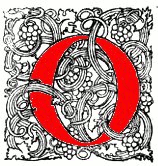Added by Jacqueline Banerjee, from an account brought to her attention by Caroline Hedengren-Dillon. George Hodder, who was at this time serving as Thackeray's "secretary, amanuensis and tour manager" (Cross 116), reminds us in a note to this passage that Thackeray's memorial in Westminster Abbey was the design and workmanship of the late Baron Marochetti."
 ne morning I was making my way to 36,
Onslow Square, at an earlier hour than usual, when,
to my great surprise, I met Mr. Thackeray pacing
up and down the footway in a state of great
mental uneasiness. It was so entirely contrary to
his custom at least as far as my experience told
me to leave his house at so early an hour, and I
was so much concerned at seeing him in such depression, that I was naturally induced to say that I hoped
nothing very serious had happened to his household.
He answered, "Poor Marochetti's child is dying."
Having said this, tears came to his relief, and he
speedily returned home. He was on terms of close
friendship with the Baron Marochetti (his next-door
neighbour), and he sympathized with that well-known
sculptor in the deep love he bore for his dying child.
He was in a cheerless mood for the remainder of the
day, and in the course of his work reverted many times
to the calamity which he so much deplored.
ne morning I was making my way to 36,
Onslow Square, at an earlier hour than usual, when,
to my great surprise, I met Mr. Thackeray pacing
up and down the footway in a state of great
mental uneasiness. It was so entirely contrary to
his custom at least as far as my experience told
me to leave his house at so early an hour, and I
was so much concerned at seeing him in such depression, that I was naturally induced to say that I hoped
nothing very serious had happened to his household.
He answered, "Poor Marochetti's child is dying."
Having said this, tears came to his relief, and he
speedily returned home. He was on terms of close
friendship with the Baron Marochetti (his next-door
neighbour), and he sympathized with that well-known
sculptor in the deep love he bore for his dying child.
He was in a cheerless mood for the remainder of the
day, and in the course of his work reverted many times
to the calamity which he so much deplored.

Marochetti's memorial sculpture of his little boy, who indeed passed aways soon afterwards. [Click on the image to enlarge it, and for more details.]
Again, on the morning of his departure for America. He was to start by an early train, and when I arrived (for it had been previously arranged that I should see him before he left) I found him in his study, and his two daughters in the dining-room all in a very tearful condition; and I do not think I am far wrong in saying that if ever man's strength was overpowered by woman's weakness it was so upon this occasion, for Mr. Thackeray could not look at his daughters without betraying a moisture in his eyes, which he in vain strove to conceal. Nevertheless he was enabled to attend to several money transactions which it was necessary he should arrange before leaving; and to give me certain instructions about the four volumes of his "Miscellanies" then in course of publication, and which he begged me to watch in their passage through the press, with a view to a few foot-notes that might be thought desirable. Then came the hour for parting! A cab was at the door, the luggage had all been properly disposed of, and the servants stood in the hall, to notify, by their looks, how much they regretted their master's departure. "This is the moment I have dreaded!" said Thackeray, as he entered the dining-room to embrace his daughters; and when he hastily descended the steps of the door he knew that they would be at the window to "Cast one longing, lingering look behind."*
"Good-by," he murmured, in a suppressed voice, as I followed him to the cab; "keep close behind me, and let me try to jump in unseen."
The instant the door of the vehicle was closed upon him, he threw himself back into a corner and buried his face in his hands. That was the last I saw of Mr. Thackeray before he left London on his second visit to the United States; and I think I have given sufficient proof that, great as was his power of poising the shafts of ridicule at the follies and vices of the day, and coldly reserved as he sometimes was in his demeanour, he was full of that gentleness of heart to which his writings constantly bear testimony, and it was his instinct to be actuated by the kindliest impulses which do honour to our common nature. [Hodder 265-68]
*"And knew the sweet strain that the corn-reapers sung." Campbell "The Soldier's Dream." The idea thus expressed that a man in the fulness of his heart may know that which he would fain see or hear, but is denied the power of doing either, has often been taken as a charming illustration of the influence which the Ideal may exercise over the Real.
Sources
Cross, Nigel. The Common Writer: Life in Nineteenth-Century Grub Street. Digital reprint. Cambridge: Cambridge University Press, 2010.
Hodder, George. Memories of My Time: including Personal Reminiscences of Eminent Men. London: Tinsley Brothers, 1870. Internet Archive. Uploaded from Robarts Library, University of Toronto. Web. 9 August 2014.
Last modified 9 August 2014